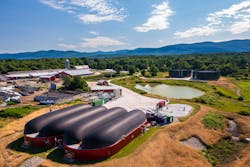AstraZeneca and Vanguard Renewables Accelerate RNG Production Using Anaerobic Digestion from Food and Farm Waste
AstraZeneca, a biopharmaceutical company, is collaborating with Vanguard Renewables to boost U.S. renewable natural gas (RNG) productivity and accelerate parity with fossil fuel-generated natural gas.
AstraZeneca will leverage its global industrial-scale manufacturing, supply chain, digital, and scientific expertise to help Vanguard Renewables increase RNG yield and generate a step-change improvement in the production of RNG. The companies also aim to add RNG capacity to the U.S. power grid and build capabilities in sustainable innovation for broader public benefit.
“The reality is that there are many challenges in adopting new energy sources, and bold action is needed if we are going to successfully transition to green energy,” said Pam Cheng, Executive Vice President of Global Operations & IT and Chief Sustainability Officer at AstraZeneca. “Our collaboration with Vanguard Renewables is another important milestone on our path to net zero by driving deep decarbonization, not just across AstraZeneca’s own operations but across the healthcare sector and beyond.”
The collaboration has identified three areas of priority:
- Enhance supply chain robustness to scale manufacturing and supply.
- Pursue capacity and design improvements to Vanguard Renewables’ Farm Powered process through innovative controls and chemistry. This will allow the company to accelerate RNG production using farm-based anaerobic digestion (AD) from food and farm waste.
- Develop Digital Twins for the AD process to enable rapid experimentation and modeling, including potentially integrating artificial intelligence.
With anaerobic digestion, food and beverage waste from the manufacturing and retail sectors are collected, sorted, unpacked on-site, and combined with dairy manure in a sealed biodigester tank. Once combined, naturally occurring manure microorganisms begin digesting the waste, converting compounds such as sugars and fats into biogas.
Harnessing the waste’s energy captures up to 95% of the potential greenhouse gas emissions that would result if the waste went to the landfill. The process also produces RNG, which is then upgraded to pipeline-quality gas and injected into existing on-site pipeline infrastructures to displace traditional fossil fuels.
This collaboration contributes to AstraZeneca’s Ambition Carbon Zero strategy, which seeks to decarbonize the value chain and the health sector at large. The company is currently on track to reduce its greenhouse gas emissions from its global operations by 98% by 2026 from 2015. AstraZeneca also aims to cut its entire value chain footprint by 50% by 2030.
This announcement builds on another collaboration between the two companies where Vanguard Renewables will deliver RNG to all of AstraZeneca’s U.S. research and manufacturing sites by the end of 2026.
About the Author
Breanna Sandridge, Senior Editor
Breanna Sandridge is senior editor for EnergyTech and Microgrid Knowledge, both part of the energy group at Endeavor Business Media.
Prior to that, Breanna was managing editor for Machinery Lubrication and Reliable Plant magazines, both part of Noria Corp. She has two years experience covering the industrial sector.
She also is a 2021 graduate of Northeastern State University (Oklahoma) with a Bachelor's in English.
